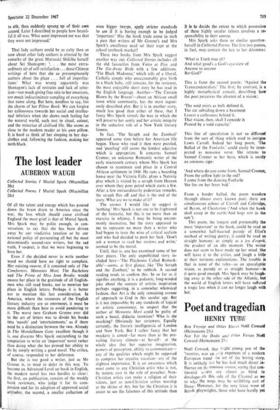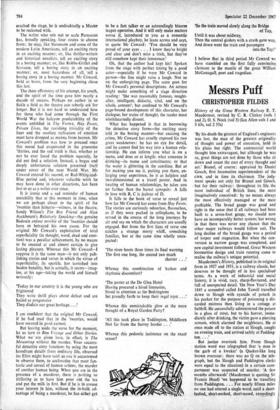Poet and tragedian
HENRY TUBE
Not Yet the Dodo and Other Verses No Coward (Heinemann 25s)
Noel Coward, that bright' young pen of the 'twenties, was an early exponent of a modern European trend the art of the boring story. It is unlikely that he has had much direct in- fluence on tilt:nouveau roman, seeing that con- tinental writers are almost as blind to developments this side of the Channel as we to whatthe wogs may be scribbling east of D
However, for the very latest wave of Brit.A playwrights, those who have hardly yet
reached the stage, he is undoubtedly a Master to be reckoned with.
The writer who sets out to scale Parnassus bas, broadly speaking, four routes to choose from : he may, like Stevenson and some of the modern Latin Americans, tell an exciting story in an exciting manner; or, like thriller-writers and historical novelists, tell an exciting story in a boring manner; or, like Robbe-Grillet and Sarraute, tell a boring story in an exciting manner; or, most hazardous of all, tell a boring story in a boring manner. Mr Coward, bold as brass, from the very beginning chose this last.
The sheer effrontery of his attempt, his youth, and the spirit of the time gave him nearly a decade of success. Perhaps no author in so fickle a field as the theatre can soberly aslefor longer. But it is not hard to understand how for those who had come through the First World War the halcyon predictability of tbe events unfolded in The Vortex, Hay Fever, Private Lives, the ravishing triviality of the lines and the resolute stylisation of emotion must have dropped as manna from.heaven.
Coward's problem was how to proceed . once this mood had evaporated in the gruesome 'thirties, and the sad truth is that, whether or not he ever faced the problem squarely, be did not find a solution. Instead, a bogus and deeply unfortunate solution presented itself under cover of the next World War. Mr Coward entered his second, or Red-Whits-"and- Blue period and, whatever valuable work he may have done in other directions, has been lost to us as a writer ever since.
It is ironic and a sad reminder of human mutability that at this moment in time, when we are perhaps closer to the spirit of the 'twenties than hitherto—witness, in the theatre, Sandy Wilson's The Boy Friend and Alan Ayckboum's Relatively Speaking—the genuine Bedouin enfant terrible of the 'twenties should have so betrayed his own cause. For the original Mr Coward's exploitation of total superficiality (in thought, word, deed and emo- tion) was a peculiar achievement, by no means to be sneezed at and almost certain to give lasting pleasure. Whereas this Mr Coward-4 suppose it is the same man—is not only pub- lishing stories and verses in which the virtue of superficiality, its sparkle, has tarnished into leaden banality, but is actually, it seems—imag- ine, at his age—taking the world and himself seriously: Today in our country it is the young who are frightened They write shrill plays about defeat and are bailed as progressive They disdain our great heritage....'
I am confident that the original Mr Coward, if he had read that in the 'twenties, would have sneezed in good earnest.
But leaving aside the verse for the moment, let us turn to Bon Voyage and Other Stories. What we- are given here, in effect, is The Mousetrap without the murder. Your success- ful detective story functions by using the most humdrum details from ordinary life, observed (as Eliot might have said) as one is accustomed to observe them, to acclimatise that most fan- tastic and unreal of human actions, the murder of another human being. When you are in the presence of a murderer, there is nothing so titillating as to have him pour out the tea and put the milk in first. But if he is to arouse your interest in him, without the in-built ad- yantage of being a murderer, he has either% got to be a fast talker or an astoundingly bizarre teapot operative. And it will only make matters worse if, introduced to you as a romantic international playboy, he leans across and says, to quote Mr Coward: 'You should be very proud of your eyes . . . I know they're bright and clear and clOn't miss a trick, but they've still somehow kept their innocence.'
Oh, that the author had kept his! Spoken from the stage with perfect timing by a good actor—especially if he were Mr Coward in person—the line might raise a laugh. Not so on the unforgiving page. The same goes for Mr Coward's personal descriptions. An actress might make something of a stage direction reading: 'She was reasonably famous, sought- after, intelligent, didactic, vital, and on the whole, content'; but confined to Mr Coward's page-bound development of this character, her dialogue, her trains of thought, the reader must wholeheartedly dissent.
What has happened is that in borrowing the detective story form—the exciting story told in the boring manner—but excising the crime, Mr Coward has cruelly exposed his two great weaknesses: he has no eye for detail, and he cannot find his way into a human rela- tionship. He can inform you what is on a menu, and does so at length; what someone is drinking—its name and constituents; or that the water is glittering in the sunshine. But as for making you see it, putting you there, en- larging your experience, he is as helpless and two-dimensional as a travel poster. And in treating of human relationships, he takes you no farther than the barest synopsis: A falls in love with B, C is jealous of D.
It falls to the book of verse to reveal just how far Mr Coward has come from Hay Fever. The stories are curiously odourless, flavourless, as if they were packed in cellophane, to be served in the course of the long journeys by air and sea on which the characters are usually engaged. But from the first lines of verse one catches a strange musty whiff, something familiar, but at the same time wholly unex- pected : The siren hoots three times its final warning The first one long, the second two much shorter . .
Whence this combination of bathos and rhythmic discomfort?
'The porter at the De Glen Hotel Having procured a hired limousine, Stood to attention as the Bedringtons Set proudly forth to keep their regal tryst . .
Whence this unmistakable glow at the mere thought of a Royal Garden Party?
'All this took place in Teddirrgton, Middlesex Not far from the Surrey border . .
Whence this pedantic insistence on the exact venue? 'So the train moved slowly along the Bridge of Tay, Until it was about midway, Then the central girders with a crash gave way, And down went the train and passengers into the Tay!'
I believe that in third period Mr Coward we have stumbled on the first fully convincing claimant to the mantle of the great William McGonagall, poet and tragedian.



































 Previous page
Previous page